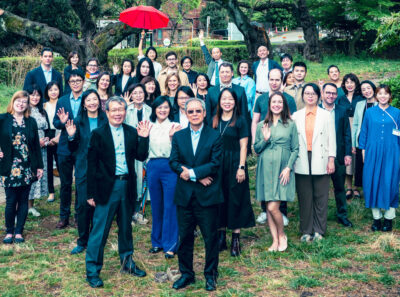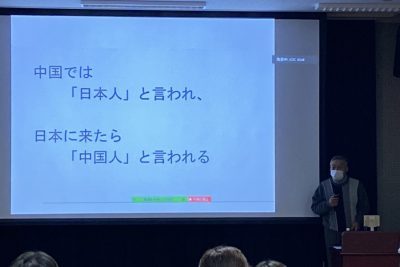What Comes Before Dialogue: Thoughts on What It Means to “Listen” and “Speak”

At a research meeting, I had the chance to hear an individual involved in the practicalities of rehabilitating juvenile delinquents explain some common yet easily misunderstood statements made by such youth. They’re difficult to comprehend. This is because the words that these youths produce are out of sync with what they want to express in their minds. Discrepancies like this aren’t limited to juvenile delinquency, as they have also been identified in cases of domestic violence, abuse, and other areas related to violence. Those who “get it” understand this disconnect, but the phenomenon otherwise remains unfamiliar to many.
I found myself wondering why we believe the words of others as they are spoken, and so on the recommendation of the meeting organizer, I immediately went to read Kotoba o ushinatta ato de [‘After Losing Words’]. The book is a collection of dialogues between NOBUTA Sayoko, long-time clinical psychologist and prolific writer, and UEMA Yōko, Professor at the University of the Ryukyus and author of media sensation Umi o ageru [‘Giving the Sea’]. Because it is a dialogue, their back-and-forth has a somewhat relaxed but authentic atmosphere that allows for interesting conversation. Nevertheless, this relaxed interaction is filled with thought-provoking commentary on some key points to keep in mind when engaging in fieldwork and other qualitative research, such as how to show concern for the person you’re interviewing and what distance and frame of mind to maintain while listening, as well as conflicts one may encounter and issues related to professionalism.
Thinking about my question from the research meeting, the book also talks about the possibilities and limitations of language while providing real-life examples. At times, simply listening to another person does not mean that you understand them, as what the other person is saying may not be what they actually want to convey. On the other hand, it is no simple matter express oneself without borrowing the words of others or forcing your thoughts to fit into pre-existing boxes, to truly break free of conventional form and express oneself freely. As a counselor, Ms. NOBUTA has her clients try to weave their own words, even if the resulting expression seems peculiar. To weave one’s own words. How many chances do we get to face ourselves like this? This book gave me a lot to think about.
The dialogue also touches on the book “Sekinin” no seisei: Chūdōtai to tōjisha kenkyū [‘Generating “Responsibility”: Middle Voice and User-Led Clinical Research’], the published version of a lecture and dialogue between KOKUBUN Kōichirō and KUMAGAYA Shin’ichirō. This book made a deep impression on me. As I was contemplating the constraints of freedom, the limitations of choice, and what it means to be an entity with responsibility, this book made me feel like I finally found what I was searching for. By borrowing the words of these two scholars and the concept of “middle voice,” I was happy that I was finally able to express my discomfort with the idea of individual autonomy. However, I was reminded that readers have different experiences and find different points interesting within a text, as Professor UEMA noted that while she found the book interesting, she had doubts about the order of appearance between the entity that “generates” responsibility and that sense of responsibility itself. Reading her comment, I wanted to know more about the kind of world that she sees and what kind of world she sees through the eyes of her research subjects.
Though we may think we live in the same society, the world that we individually see is different. Precisely for this reason, we must communicate our differences using words, even if there’s a limit to those words, and even if the meanings aren’t quite right. Before writing his magnum opus Leviathan, Thomas Hobbes wrote The Elements of Law, Natural and Politic, wherein he carefully defined each and every word associated with humanity, such as “love” and “beauty,” as a prelude to his explanation of the importance of peace and sovereignty. He explains each of them one by one in his own words, such that in the reading group in which I read the book, someone commented that Hobbes must have been a tiresome individual. But, when I look back on The Elements of Law now that I’ve read Kotoba o ushinatta ato de, I think that we, like Hobbes, also need to explain concepts one-by-one in our own words. Even if we speak the same language, the words that we use and how we interpret their meanings are different. However, when we open a dialogue with someone, it’s also important to consider what concepts lie beneath their words, and what their words mean from their perspective. It is through such actions that we realize the “self” and the “other.” Moreover, we are able to ask ourselves what it means to listen to another, and what it means to understand them. Attempting to answer these questions should inform the approach we take to dialogue.
References
Nobuta, Sayoko, Uema, Yōko. (2021). Kotoba o ushinatta ato de. Tokyo: Chikuma Shobō.
Kokubun, Kōichirō, Kumagaya, Ichirō. (2020). “Sekinin” no seisei: Chūdōtai to tōjisha kenkyū [‘On Generating of “Responsibility”: Middle Voice and User-Led Clinical Research’]. Tokyo: Shinyōsha.
Hobbes, Thomas. (2019). Hō no genri [The Elements of Law, Natural and Public] (Takano, K., Trans.). Tokyo: Chikuma Shobō. (Original work published in 1640)








